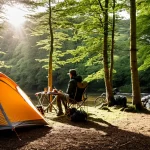Economic Contributions of Camping to UK Tourism
Camping plays a significant role in driving revenue for the UK tourism sector, supporting both national and local economies. The appeal of outdoor experiences fuels tourism growth, especially in rural areas where traditional attractions may be limited. This surge in demand stimulates various industries, including retail, hospitality, and transport.
One vital aspect of camping is its economic benefits through local job creation. Campsites, gear hire shops, and hospitality services all require staff, providing steady employment opportunities in often economically vulnerable rural communities. These jobs span from seasonal roles to year-round positions, helping stabilize local incomes.
This might interest you : What Are the Best Outdoor Activities to Try While Camping in the UK?
Regionally, specific case studies highlight the tangible impact: areas with popular campsites report increased visitor spending, which then feeds into community development projects and infrastructure improvement. For example, rural tourism destinations benefit directly from camping-related expenditure, underscoring camping’s role in broadening the tourism base beyond urban centers.
By supporting rural tourism, camping helps diversify the UK economy, making it more resilient and providing meaningful work for many. Its contribution is a key pillar of sustained tourism growth and local economic vitality.
This might interest you : What Unique Destinations Can One Discover While Camping Across the UK?
Camping’s Influence on Visitor Demographics and Travel Trends
Camping trends in the UK reveal a significant shift in visitor demographics and travel preferences. This outdoor travel option now appeals to a wide range of age groups and backgrounds, from young professionals seeking budget-friendly escapes to families eager for immersive nature experiences. The generational appeal of camping grows as younger tourists, including millennials and Gen Z, embrace camping as a sustainable and social way to explore the countryside.
Moreover, international tourists increasingly opt for camping during their UK visits, attracted by the country’s scenic landscapes and the affordability of this travel style. This change diversifies the tourism demographics, making camping a bridge between cultures and travel styles.
Travel behaviour is evolving with a clear preference for flexibility and cost-effectiveness. Camping aligns perfectly with these trends, providing convenience without sacrificing adventure. The ability to tailor experiences—from basic tent pitching to glamping—makes it attractive across varied income levels and interests, enhancing its role in shaping future tourism patterns. This combination of diversity and adaptability underpins the growing popularity of camping trends in the UK’s vibrant tourism sector.
Empowering Rural Communities and Sustainable Tourism
Rural tourism offers a powerful opportunity to boost local economies by encouraging visitors to explore less-traveled areas. Developing rural destination appeal involves improving infrastructure like roads, signage, and accommodations, making these areas more accessible and attractive to tourists. Such enhancements not only increase visitor numbers but also create jobs, supporting community livelihoods.
Supporting community-based tourism initiatives empowers locals to lead tourism development tailored to their culture and environment. These initiatives nurture authentic experiences while ensuring that economic gains stay within the community. Examples include guided tours led by residents or locally run craft workshops, which deepen visitors’ connections and respect for the region.
Sustainable tourism focuses on minimizing environmental impact. Eco-friendly camping is an excellent practice, reducing waste and conserving natural habitats. Campers using low-impact equipment and respecting wildlife help preserve ecosystems. This approach aligns well with rural areas reliant on clean and pristine landscapes, sustaining these destinations for future visitors and residents alike.
Fostering rural tourism through community involvement and sustainable methods creates a positive cycle of growth. It promotes environmental stewardship while offering economic resilience, making rural areas vibrant and inviting destinations.
Cultural and Social Enrichment Through Camping
Camping offers more than just a retreat into nature; it fosters cultural tourism by encouraging campers to engage deeply with local traditions and heritage. In many UK regions, camping sites are positioned near historic landmarks and community events, providing immersive opportunities to explore UK heritage firsthand. Participating in such activities lets campers experience regional customs, cuisine, and festivals, enriching their understanding and appreciation of the area’s culture.
Beyond personal enrichment, camping promotes social tourism by creating shared experiences among visitors. Communal spaces like campfire circles or group hikes naturally encourage social interaction, enabling campers to build meaningful connections with others. These interactions often lead to exchanges of stories, tips, and cultural insights, enhancing the overall experience.
Furthermore, camping plays a vital role in preserving and showcasing regional heritage. By supporting local crafts, food producers, and guides, campers contribute to sustaining traditions that might otherwise decline. This reciprocal relationship benefits both visitors and communities, strengthening cultural pride and fostering continued conservation of local customs and environments.
Innovation and Diversification in UK Camping Experiences
The UK camping scene is rapidly evolving, driven by growing demand for glamping and other novel tourism experiences. Traditional camping is being transformed by innovative formats like themed campsites that create immersive, experiential travel opportunities. Whether it’s treehouses, vintage trailers, or eco-pods, these unique accommodations cater to travelers seeking more comfort and distinctive stays, combining nature with luxury.
Technology in tourism now plays a vital role in enhancing guest experiences. Many campsites integrate smart booking systems, mobile apps for onsite services, and even virtual tours, making planning and staying more seamless. For example, some locations use IoT devices to control lighting and heating inside tents, improving convenience without sacrificing the outdoor feel.
Successful adaptation is evident in established UK campsites that have diversified their offerings, blending traditional camping appeal with modern amenities. This camping innovation not only broadens appeal but also boosts off-season bookings. The result is a richer, more inclusive tourism landscape where guests can enjoy nature alongside comfort and convenience—precisely what today’s travelers seek in their outdoor adventures.
Comparison: Camping Versus Other Tourism Sectors
Exploring how camping stands apart in the tourism landscape
Camping vs hotels displays a clear contrast in experience and appeal. While hotels offer comfort and consistent services, camping provides a closer connection to nature and a sense of adventure. This makes camping a preferred choice for travellers seeking more authentic and immersive experiences. Unlike traditional accommodation, camping often emphasizes self-sufficiency and flexibility, allowing visitors to set their own pace and schedule.
Adventure tourism broadly encompasses activities beyond relaxation, including hiking, kayaking, and wildlife exploration. Camping naturally integrates with these experiences, making it a central component rather than just an add-on. Compared to other travel alternatives, camping tends to be more affordable, promoting sustainable travel by encouraging environmental awareness and minimal impact.
From a competitive analysis perspective, camping captures a niche that appeals to both budget-conscious families and thrill-seeking individuals. However, it also presents limitations such as weather dependency and reduced amenities, which might deter some tourists. Despite these limitations, camping offers unique value in the UK tourism industry by fostering community engagement, boosting rural economies, and supporting eco-tourism goals in ways conventional tourism sectors cannot match.




